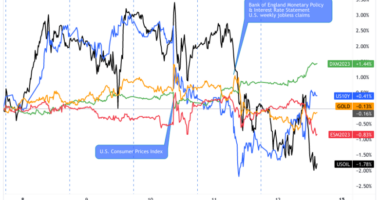Positive global risk sentiment, weak economic updates, and dovish commentary from ECB members lead to a negative start for both the Swiss franc and euro. And despite a slight shift in global risk sentiment towards negative by the end of the week, both currencies were unable to recover by the Friday close.
The Euro


European Headlines and Economic data
Monday:
EU to impose tariffs on up to $4 billion of U.S. products over a “a “lack of progress” from America on resolving a long-standing dispute over aircraft subsidies.”
UK, EU make one more push for elusive Brexit trade deal – “As EU chief negotiator Michel Barnier met his British counterpart, David Frost, in London, members of Britain’s House of Lords were trying to rip up a contentious Brexit bill that threatens to derail negotiations.”
German exports +2.3% m/m in August 2020; -3.8% y/y
Sentix Investor confidence falls to -10.0 in Nov. from -8.3 in October
French economy operating down 12% under new lockdown – central bank – “The government imposed the new lockdown on Oct. 30 to rein in a surge in new cases although the restrictions were softer than the first time to limit the impact to the euro zone’s second-biggest economy.”
Tuesday:
German investor moral drops on concerns over second coronavirus lockdown – “The ZEW economic research institute said its survey of investors’ economic sentiment fell to 39.0 points from 56.1 points the previous month. That undershot a Reuters poll for a reading of 41.7.”
French Industrial Production Continued to Recover in September – “Total industrial output–comprising output in manufacturing, energy and construction–rose 1.4% in September compared with August. Economists had forecast a 0.6% increase in September, according to a poll by The Wall Street Journal.”
Italy Sept industry output falls more than expected after four monthly rises, falling 5.6% which was well above an expected 2.0% fall by analysts
Euro zone budget aid may need to be stepped up: ECB’s Knot
Wednesday:
Lagarde warns against vaccine optimism and hints at more ECB easing
ECB must act to fend off deflation, Bank of Spain official says – “Euro-area inflation has been below zero since August as the coronavirus pandemic crushes demand, and underlying price growth excluding volatile items is at a record low.”
Thursday:
Industrial production down by 0.4% in euro area and unchanged in EU
ECB Economic Bulletin: November 12, 2020
- Incoming data point to a fast rebound of global activity in the third quarter, but also to momentum slowing down afterwards.
- In addition to weak labour market prospects, uncertainty is weighing on consumer behaviour.
- Euro area sovereign bond spreads relative to risk-free rates have continued to decline across jurisdictions amid expectations of further monetary and fiscal support.
- Following the unprecedented fall in euro area output in the second quarter of 2020, economic growth is set to rebound in the third quarter, before falling again in the fourth quarter.
- Short-term labour market indicators have partially recovered but continue to signal contractionary developments.
- The recovery in demand for goods remains uneven.
- After collapsing in the second quarter, euro area trade rebounded strongly in the third quarter of 2020.
- Looking further ahead, a sustained recovery remains highly dependent on the course the pandemic takes and the success of the containment policies.
- Headline inflation became slightly more negative in September 2020. Measures of underlying inflation declined.
German November lockdown will hit fourth quarter growth but aid should help: Scholz
Friday:
German Wholesale prices fall -1.9% y/y in October
German Building permits rise +0.9% y/y in September
GDP up by 12.6% and employment up by 0.9% in the euro area
Euro area international trade in goods surplus €24.8 bn
ECB Schnabel explains why this recession is very different from any other – “The current crisis hinges on the services industry, which has almost come to halt since social restrictions were introduced across the world earlier this year.”
ECB policymakers cautious despite vaccine progress – “Spanish central bank governor Pablo Hernandez de Cos and ECB board member Isabel Schnabel were echoing a cautious tone from President Christine Lagarde a day earlier, cementing expectations for fresh stimulus in December.”
The Swiss Franc


Swiss Headlines and Economic data
Monday:
The big market driver of the week came on Monday from Pfizer / BioNTech, announcing that their COVID vaccine is more than 90% effective. This sparked a big risk-on move across the financial markets as traders priced in the odds of an economic recovery coming sooner rather than later. This sentiment did fade by the Monday U.S. session, but lingered on to influence the markets through most of the week. The Swiss franc and euro spiked lower against most of the majors on the news, losing out to the usual safe haven currency king, the Japanese yen.
Wednesday:
The Swiss franc begins to recover Wednesday & Thursday, likely a move supported by a broad shift in risk sentiment towards negative. It’s likely traders were coming off vaccine news highs and focusing on the rising COVID cases in Europe and the U.S., as well as the falling odds of a new stimulus bill coming from the U.S. government.
Friday:
Swiss Producer and Import price index remained stable overall in October 2020
Lockdowns start to limit Covid-19 spread in Europe – In Germany, which began a “lockdown light” on 2 November, Lothar Wieler, the head of the country’s disease control agency, RKI, said on Thursday the infections curve was flattening, showing “we are not helpless against this virus”.









